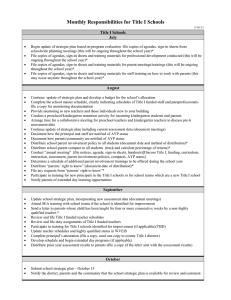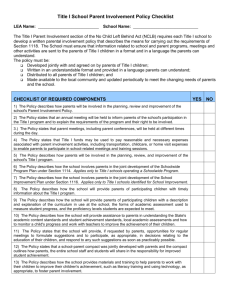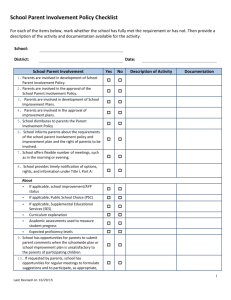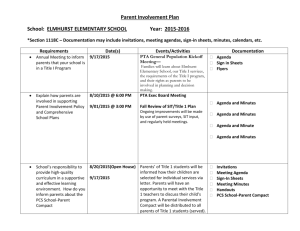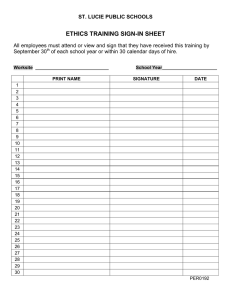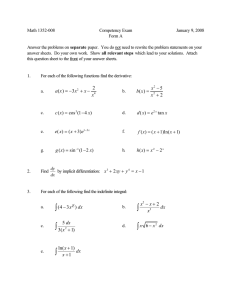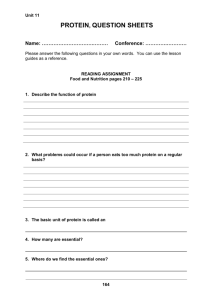Title I Evaluation/Implementation Tool School Wide Programs
advertisement
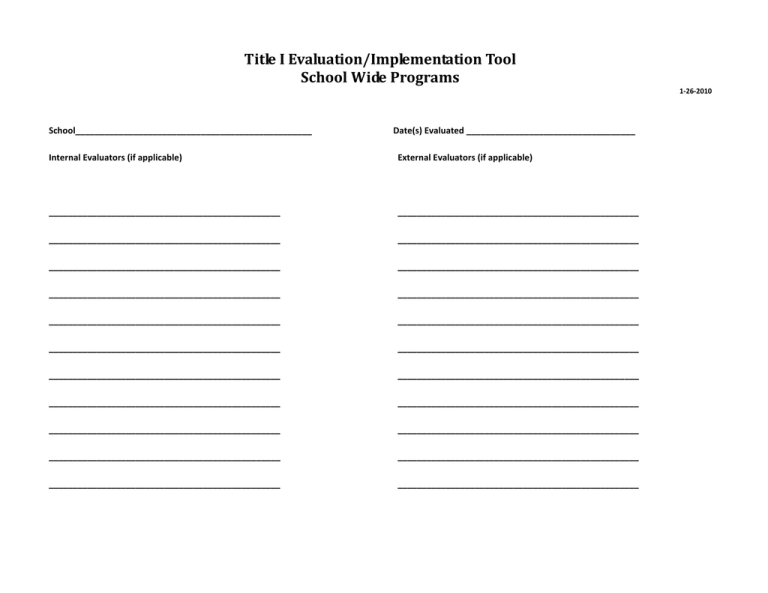
Title I Evaluation/Implementation Tool School Wide Programs 1-26-2010 School_________________________________________________ Date(s) Evaluated ___________________________________ Internal Evaluators (if applicable) External Evaluators (if applicable) ________________________________________________ __________________________________________________ ________________________________________________ __________________________________________________ ________________________________________________ __________________________________________________ ________________________________________________ __________________________________________________ ________________________________________________ __________________________________________________ ________________________________________________ __________________________________________________ ________________________________________________ __________________________________________________ ________________________________________________ __________________________________________________ ________________________________________________ __________________________________________________ ________________________________________________ __________________________________________________ ________________________________________________ __________________________________________________ Criteria School Governance and Leadership What evidence exists to indicate the school has a shared leadership structure to support and improve school programs? Planning Committee Should this membership change? The stakeholders represent various school groups or committees. Parents/community members are involved in the planning. The stakeholders remain active in the support and implementation of the schoolwide program plan. Title I teachers are part of the planning committee Planning Committee Narrative Did the schoolwide planning committee meet as planned? Why/why not? The planning committee meets regularly (monthly, quarterly) to review and evaluate progress on the goals, objectives, and actions. Documentation (agendas, sign-in sheets, minutes) is maintained. School Culture and Climate What evidence exists to indicate there is collaboration and collegiality among staff members? What efforts are taken to ensure a safe and welcoming environment? Core Beliefs and Mission Statement Are these current and pertinent? Core Beliefs reflect qualities of highly effective schools. The Mission Statement conveys what the school is striving to accomplish. The Mission Statement is easy for every staff member to remember. Comments/Suggestions for Improvement Meets Compliance Curriculum and Instruction Data Analysis Did student achievement increase/decrease? Reasons? Is this narrative information current? Have the root causes changed? Possible reasons for the change. Data analysis is used to inform and guide instruction. Data analysis has been completed annually and includes a narrative summary for each category below: 1. Key Outcome Indicators 2. External Trends 3. Student Achievement 4. Other Student Outcomes 5. Analysis of Culture, Conditions and Practices 6. OEPA Analysis 7. Framework for Literacy 8. 21st Century Framework The school has determined the root causes for identified deficiencies. Prioritized Strategic Issues Have these changed as issues have been addressed? Prioritized strategic issues have been identified for the school based on the needs assessment and/or root causes. Prioritized strategic issues may change through the course of the school year. Goals and Objectives Were the objectives met? Why/why not? Based on the data and needs assessment, should these change? Goals align with the needs assessment and address reading/language arts and mathematics. Objectives are written to target specific measurable outcomes related to the goal. Objectives are written to target specific measurable outcomes related to the subgroups which did not meet AYP. Action Steps Were the action steps accomplished? Why/why not? Actions describe HOW the goals and objectives will be accomplished. Action steps are detailed, sequential steps to be taken to implement the strategies selected. Action steps are detailed enough to act as a monitoring process for district personnel. Action steps describe HOW the school plans to review and evaluate progress on the goals, objectives, and actions (e.g., benchmark testing three times a year using Acuity). Action steps embed parent involvement throughout. Standards Based Instruction and Assessment What evidence exists to indicate teachers select standards based instructional strategies? Have teachers deconstructed the CSOs and developed common assessments? How is student engagement maximized in all classrooms? Has the school conducted an Instructional Practices Inventory? Teacher Involvement in the Use of Academic Assessments How are teachers utilizing a balanced assessment system to differentiate instruction for ALL students? Are collaboration meetings focused on student achievement? Collaborative planning meetings are focused on increasing student achievement (agenda, meeting notes, sign-in sheets). Teacher involvement in the methods used to identify at-risk students is documented (collaborative planning meeting notes, signin sheets, agendas). The master schedule reflects time for teacher collaboration. Title I teacher schedules are adjusted based on student assessment data and student need. Classroom instructional strategies are adjusted based on assessment data and student need. Extended time for Learning Does the school have tiered instruction in place for both reading/language arts and mathematics? Does the school maintain documentation of additional instruction for students (e.g., lesson plans, intervention folders)? Is the extended day ( 4 days per week) or the extended year (4 additional weeks) conducted for an adequate amount of time to impact achievement? How does the school measure increases in achievement for students who participate in extended time programs? Is documentation of extended day/year programs is maintained at the school (e.g., attendance records, lesson plans/activities)? Transition Plans What assistance does the school provide to new students who are transitioning from another school? What transition activities are conducted to assist students in transitioning to the next programmatic level? What evidence exists to indicate the Pre-K transition plan is effective? Specific activities are described to address the transition of children from early childhood programs (Head Start, private preschools) to kindergarten. Documentation of these activities is maintained at the school. The school provides an opportunity for the child and his/her family to visit the setting to which the child is transitioning. Written information is distributed to parents regarding kindergarten registration and expectations. Documentation is maintained at the school. Coordination and Integration of Services and Programs Are all sources of funding used to support the school plan? A description of the school’s integrated programs is included (e.g., character education, nutrition, attendance). A description of how the school integrates and coordinates programs and services is included. Professional Development and Highly Qualified Teachers Has the school devoted sufficient resources to carry out effectively the professional development activities for each fiscal year? Was all planned professional development offered? Has the school implemented new strategies as a result of professional development? How is the implementation of new instructional strategies monitored and evaluated annually for effectiveness? Is required documentation of professional development activities maintained (agendas, sign-in sheets, training materials)? School Based Professional Development Plan Professional development activities correlate to each goal. Professional development activities correlate to objectives. Professional development activities reflect sustained, on-going, quality training. Professional development activities are presented in a variety of delivery methods (e.g., professional learning communities, trainerled, conferences) embedded in the school day whenever possible. Professional development activities include training for staff members in how to work with parents as equal partners. Staff Certification/Qualification Is this list current and up-to-date? Has the WVEIS list been updated for teaching assignments and certifications? A list of ALL staff members, including name, job assignment and certifications is included in the plan. Title I staff is clearly identified. Qualifications of all paraprofessionals/aides are listed. Highly Qualified Teachers Can the school/Should the school do more to retain staff? How does the staff try to recruit new teachers to the school? The strategies utilized by the school to attract and retain highly qualified teachers are addressed. The strategies are aligned with the district procedures for increasing the percentage of highly qualified teachers. Staff Utilization Based on student need, is this pertinent and current? The number of Title I funded staff members for each subject area or position is listed. The delivery model is clearly indicated (e.g., in-class, pull-out, Tier II or Tier III interventions). Utilization of Title I staff is clearly described by grade level and content area. Utilization of Title I staff addresses student deficiencies as derived from data analysis. Parent Involvement Parent Involvement Policy The school parent involvement policy is aligned with the ED template and includes all required components. The school parent involvement policy dates are current. Documentation of how and when the school parent involvement policy was distributed to parents is maintained at the school. Documentation of how and when the DISTRICT parent involvement policy was distributed to parents is maintained at the school. The school parent involvement policy is reviewed/revised annually with pertinent documentation maintained at the school (agendas, meeting notes, sign-in sheets). School-Parent Compacts The school-parent compact is aligned with the ED template and includes all required components. The school-parent compact dates are current. Documentation of how and when the school-parent compact was distributed to parent is maintained at the school. The school has a method for tracking and calculating the compact return rate. The school-parent compact is reviewed/revised annually with pertinent documentation maintained at the school (agendas, meeting notes, sign-in sheets). Parent Trainings, Workshops, Correspondence Were all trainings listed conducted? Why/why not? Was attendance acceptable? Should the school explore alternate ways to involve more parents? Parent trainings and workshops are listed in the plan with specific titles, presenters and dates. Parent trainings and other activities focus on assisting parents in the understanding of child development, child rearing and ways to assist their child with academics. Documentation of trainings/workshops is maintained at the school (agendas, sign-in sheets, training materials). The school conducts an annual meeting to describe the Title I program to stakeholders. Documentation of the annual meeting is maintained at the school (announcement, sign-in sheets, agendas). The school documents correspondence sent home (brochures, newsletters, announcements). Frequency of correspondence is noted. The Title I Schoolwide Plan is available for parents and other stakeholders to review. Special thanks to the following individuals who assisted with the creation and editing of this document: Charlene Coburn, Co-Director of Federal Programs, Literacy Supervisor, Lincoln County Schools Bruce Faulkner, Director of Federal Programs and Preschool, Putnam County Schools Janet Murray, Director of Federal Programs, Jackson County Schools Pam Padon, Title I Director, Kanawha County Schools Joe Stewart, NCLB/Title I Director, Wyoming County Schools Mellissa Godfrey, WVDE Title I Coordinator Jane Massi, WVDE Title I Consultant
